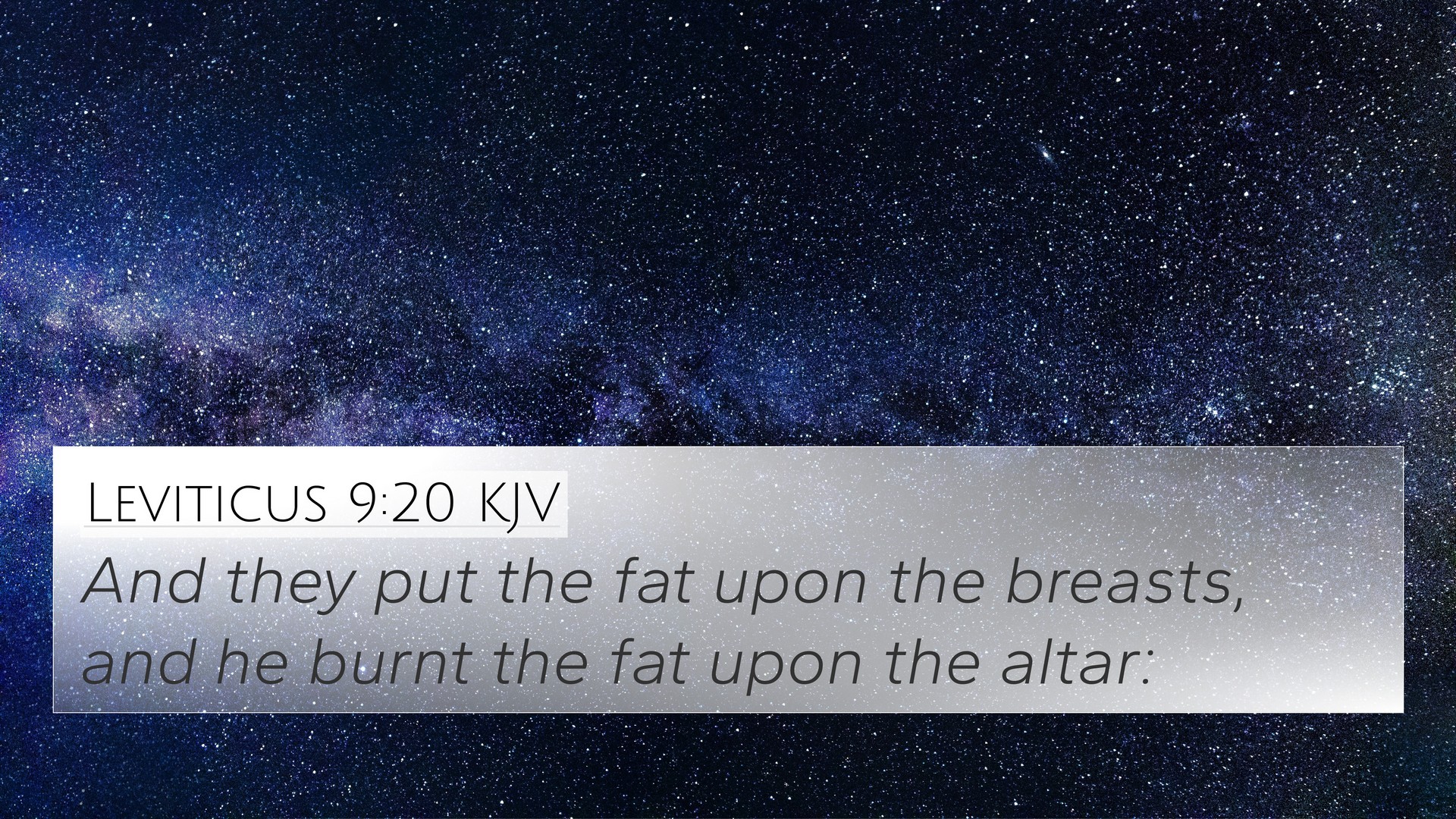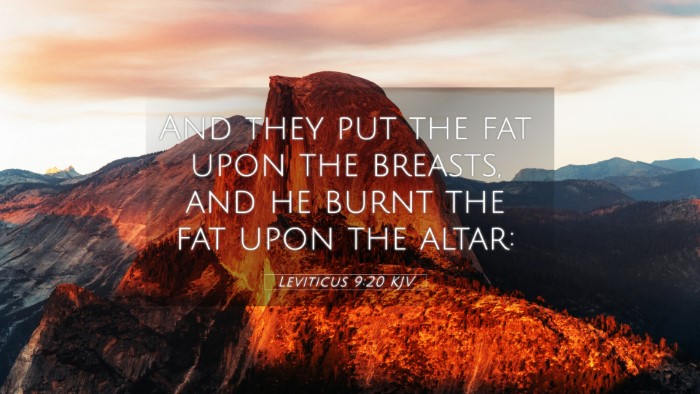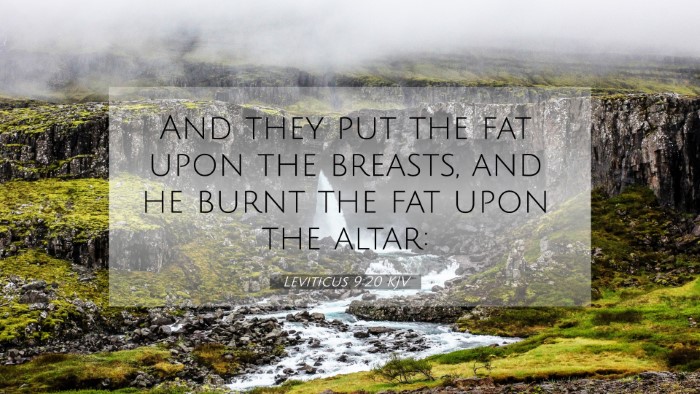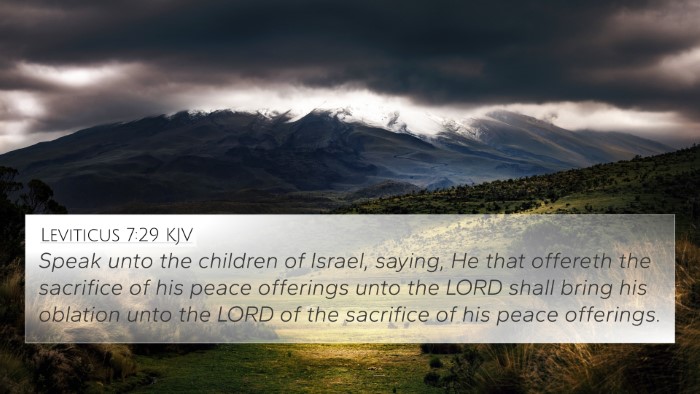Understanding Leviticus 9:20
Bible Verse: Leviticus 9:20 - "And they put the fat upon the breasts, and he burnt the fat upon the altar:"
Summary of the Verse Meaning
This verse describes a part of the sacrificial system established within Israelite worship. The act of placing fat upon the breasts indicates a specific procedure within the offerings made to God, symbolizing dedication and reverence. This practice highlights the importance of following the prescribed rituals laid out by God for worship, reflecting both obedience and the seriousness of approaching the divine.
Commentary Insights
Matthew Henry's Commentary
Matthew Henry emphasizes that the offerings were to be done in accordance with divine instructions. The fat being burnt on the altar signifies an act of worship and conveys the idea that the best portions are given to God, highlighting His holiness. Henry also notes that this meticulous attention to detail in worship underscores the necessity of proper conduct in approaching God.
Albert Barnes' Commentary
Albert Barnes elaborates on the significance of the burnt offerings, indicating that the fat was considered the choicest part and held great value in sacrifice. The act of burning the fat illustrates the idea of complete surrender to God, as it was consumed by fire, representing the acceptance of the offering by God. Barnes further connects this practice with New Testament interpretations of sacrifice, drawing parallels with Christ's ultimate sacrifice.
Adam Clarke's Commentary
Adam Clarke focuses on the ritual purity and the symbolic meanings behind each aspect of the offering. He explains that the act of burning the fat stems from its perceived spiritual significance in ways that represent the purification of worship. Clarke also suggests that each part of the sacrifice had a purpose, emphasizing the theological implications of ritual observance and its importance in maintaining a relationship with God.
Bible Cross-References
- Exodus 29:22: Discusses the specific parts of the sacrifice designated for burn offerings.
- Leviticus 3:16: Highlights the importance of fat in animal sacrifices, indicating it is sacred to the Lord.
- Leviticus 4:8-10: Details how the fat of sin offerings is to be treated, reiterating its significance.
- Hebrews 9:14: Connects the Old Testament sacrificial system with the perfection brought by Christ.
- Romans 12:1: Encourages present-day believers to present themselves as living sacrifices, drawing on the same concepts.
- 1 Peter 2:5: Refers to believers as living stones being built into a spiritual house, relating to the sacrificial practices.
- Leviticus 1:9: States that the burnt offering is a pleasing aroma to the Lord, connecting to the act of devotion seen in Leviticus 9:20.
Connections Between Bible Verses
The act of offering in Leviticus 9:20 reveals rich theological implications that extend throughout the narrative of Scripture. This verse is often cross-referenced with others to highlight themes such as sacrifice, worship, and the holiness of God.
Thematic Bible Verse Connections
- Sacrifice: Leviticus 1:3-4 demonstrates the need for a proper sacrifice, paralleling Hebrews 10:12 where Jesus is the eternal sacrifice.
- Worship: John 4:24 emphasizes worship in spirit and truth, grounding the physical sacrifices in a deeper spiritual dynamic.
- Holiness: Isaiah 6:3 shows the holiness of God, connecting back to the very offerings made in Leviticus.
How to Use Bible Cross-References
Utilizing tools for Bible cross-referencing can greatly enhance understanding. Study a verse like Leviticus 9:20 in conjunction with related verses to uncover thematic echoes and deeper meanings. Here are some methods:
- Consult a Bible concordance to find related scriptures.
- Engage in comparative Bible verse analysis to see the continuity in themes.
- Utilize a cross-reference Bible study guide for structured study sessions.
Identifying Connections Between Old and New Testament
Leviticus 9:20 not only serves as a significant part of the Old Testament sacrificial system, but its implications resonate through the New Testament. Understanding these connections provides insights into God’s plan of redemption and the fulfillment of the law through Christ.
Detailed Cross-Reference Between Gospels
Examining the different Gospel accounts allows for a layered understanding of how the themes present in Leviticus are fulfilled in the life and ministry of Jesus. For example, the concept of sacrifice permeates the Passover narrative in the Gospels, linking back to the sacrificial system.
Conclusion
In studying Leviticus 9:20, one can appreciate the depth and complexity of covenant worship. By cross-referencing this verse with others throughout the Bible, believers today can deepen their understanding of themes related to sacrifice, worship, and God's holiness. Engaging in inter-biblical dialogue enriches the devotional life and prepares individuals for a more profound spiritual journey.




